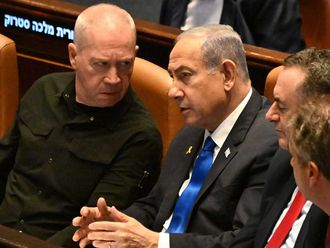Dubai: In a unexpected move that conveys negative feelings to Arabs, a joint American-Russian proposal was presented to Arab countries recently, calling for a peaceful settlement to the Arab-Israeli conflict, before discussing Israel's nuclear capability, a senior official at the Arab league confirmed.
"Indeed, there is an American-Russian paper that has been presented to the Arab league," said Hesham Yousuf, Director of the Arab League Secretary-General's Office.
Speaking to Gulf News from Cairo, Yousuf explained that Arab countries will hold talks concerning the new American-Russian proposal within the framework of the preparation for the Nuclear Nonproliferation Treaty Review conference in New York, scheduled to open on Monday.
"There will be a meeting for the Arab delegations on Sunday [today] to consult and coordinate positions over the issue," he said, adding that there will also be an "exchange" of ideas throughout the month-long conference.
Weapons-free region
While Yousuf declined to elaborate on the details of the proposal, he said Arab countries "agree with some of its elements, disagree with some others, and believe there are some elements that can be further developed" to achieve the goal of proclaiming the Middle East region free from weapons of mass destruction, mainly nuclear weapons.
"We are not going to discuss the points of agreement and disagreement through the media. The proposal has been submitted to the Arab countries to discuss it, and it is very important that we discuss how we can serve the Arab interests in such an important conference," he said in reference to the meeting, which will start tomorrow at the UN headquarters in New York.
Earlier, the pan-Arab newspaper, Al Hayat, reported that the joint proposal is laying down the conditions for achieving a peaceful settlement to the nearly 62-year-old Arab Israeli conflict, as a pre-requisite to the implementation of the 1995 decision of declaring the Middle East region free from weapons of mass destruction.
During a 1995 nuclear non-proliferation conference, Egypt led an Arab rejection of the extension of the treaty unless Israel joins the agreement. However, Cairo backed down later under western pressures, some press reports noted.
The recent joint proposal further calls for the commitment of all Arab countries to remove all biological and chemical weapons, impose a ban on conducting nuclear tests and the compliance with all agreements related to the removal of all weapons of mass destruction, before discussing Israel's nuclear programme.
Renewed calls
Israel, which is believed to have a considerable nuclear arsenal, has never acknowledged possessing nuclear weapons.
Calls by Arab nations for Israel to open its installations for inspection have been renewed with the west requesting Iran to cooperate with international atomic inspectors.
According to Al Hayat newspaper, calls to the region's countries to cooperate to "overcome nuclear fears" were also included in the joint proposal in a move that was interpreted as an indirect reference to Iran and Syria.
The two big powers, moreover, called on the Middle Eastern countries to open their nuclear installations for inspection, according to some press reports, in an attempt to reconcile with the 1995 decision of declaring the Middle East region free from weapons of mass destruction.












